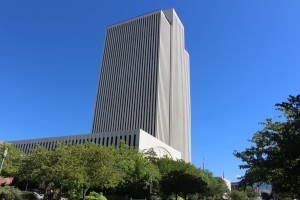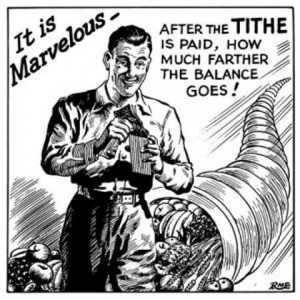Money is a touchy topic. I remember feeling really uncomfortable towards the end of graduate school when a classmate of mine would openly ask recently hired employees of various chemical companies what their starting salaries were. I understand his interest for I too wanted to know what I could possibly expect in terms of income upon graduating, but it was just uncomfortable because money and income are culturally understood as taboo subjects. We place both our money and spending into our private sphere.
For the LDS, one place that can take the details of income out of concealment is church. Members of the LDS church, like other Christian denominations, are strongly encouraged to pay 10% of their income to the church as part of their religious devotion. In order to be considered a member in good standing and to gain access to the temple, the holiest place in the LDS faith, members must declare to their local ecclesiastical leaders that they are indeed full tithe payers. This is done somewhat informally whenever a temple recommend is renewed as well as formally at the end of the year during annual tithing settlement.
An annual tithing settlement was instituted during the 19th century when many, if not most members lived an agrarian lifestyle and it did not make sense for all members to declare tithing until the harvest had been collected and accounted for. The tradition of annual accounting holds strong today and for many it is an occasion to reaffirm their obedience to the commandment by reviewing their own income records against records of tithing donations to ensure that they are indeed fully compliant with the law of tithing.
One important detail from the recent newsroom article, which announced the approval of online donation payments, is the statement that tithing and other donations are “paid on the honor system. No one asks to see income statements or pay slips.” This statement is true in the sense that bishops and clerks do not request proof of income to determine whether a member is paying a “true” full tithe. The problem though is that privacy or confidentiality of donations is not a reality. The donations of members are trusted to be held in the confidence of the bishopric and ward financial clerks, without any sharing of income information (which is easily deduced on the basis of the tithing donation amounts) to other ward members. The information of how much a member donates can be sensitive and unfortunately the amount of member donations is not always kept in confidence, nor is it always respected as sensitive information.
Anecdotal reports, such as how my bishop told my then newly-wed wife and me that we “ought to teach a class on finance” (presumably because of our survival on low income at the time), serve as evidence that some in leadership positions do not show the same level of respect and sensitivity to members personal finances as they probably should. Another anecdote reported that a counselor passing out settlement statements in the hallway of a ward building jokingly informed a member that he did not approve of their income level indicating that they “make too much money.” Examples of this behavior showing a disregard for financial privacy are likely, in my opinion, few and far between. Though the embarrassment and discomfort of having ones financial information shared with neighbors should not occur through ecclesiastical channels ever, yet it does.
In discussing the issue of confidential donations online I have observed that many members, including myself until recently, are not aware of any option to make payments to the church directly without the local leaders receiving detailed reports of the donations. Yet a few members have been informed through word of mouth that there are options available for such a payment plan (it is called a bill-pay plan). While looking through the screen shots of the upcoming online donation payment system I was not able to find any indication that a confidentiality option is available (one that allows a member to donate to the church directly but does not report donation details to the local leadership).
 I contacted the Donations and Donations in-kind Department at church headquarters and asked about the new system and whether a confidential option will be available. I was told that the new online system will roll-out to different areas throughout the year and there is no plan to include a confidential option through the new online system.
I contacted the Donations and Donations in-kind Department at church headquarters and asked about the new system and whether a confidential option will be available. I was told that the new online system will roll-out to different areas throughout the year and there is no plan to include a confidential option through the new online system.
I also learned that by calling the donation department (801 240 2554) or emailing them (donations@ldschurch.org) a member can make tithing and other donations through the “bill-pay” system which includes confidentiality as an elective. A recent SL Tribune article also raised the bill-pay option to public consciousness. My inquiry into confidentiality and reasons for being interested in confidentiality options was noted by the department representative and presumably passed on to superior department employees as important information.
If Elder Oaks is right and there really is not any form of aristocracy in the church1 that has access to more information, more power, or more options, then knowledge of the bill-pay option with confidentiality should be made widely available to all members (not just those who know the right people). Perhaps even part of the annual tithing settlement could include instruction in the various ways a member can make donations. In the age of the internet and information technology advances I don’t see it as a stretch for this world wide church to simply provide a confidentiality check box in the online donation form for members to take advantage of, should they feel inclined to do so. For even according to the newsroom we are operating on the “honor system,” aren’t we?
1. See section I of Oaks April 2014 address which implies a flat social structure in terms of privilege or honor.







The lack of confidentiality is to meet the IRS requirements not so the Bishop to know how much you make. If you want to for go the Tax right-off just give anomiosly, and no one will know
5+ years ago, when I was bulletin coordinator, I put the how-to tithe confidentiality instructions in the bulletin and got reamed by the Bishop (“if people want to know how to do this they can come to me and I will tell them”). Maybe it was leadership roulette, maybe the situation with corporate has changed since then, maybe the word is out and there is nothing they can do about it.
Todd Hadden,
I don’t understand your statement. 5+ years ago I donated directly to HQ and got a (IRS tax) receipt from them and the Bishop received no information about the transaction.
Todd Hadden,
Todd,
You do not need your bishop to see your tithing donations in order to claim your donations as a tax write-off. The church can still send the member statements that will fulfill the IRS requirements.
You do not need a letter from the church with an amount on it to prove donation, tithe, or offerings. A canceled check serves as proof of tax-deductible donation, tithe, offering. As a matter of fact, when in-kind donations are made to a church the receipt should be acknowledging the gift, not the value of the gift. Determining the value of the gift is between the taxing agency and the giver. Tithes, offerings, and donation amounts are not legally privileged or confidential. Too many “church members” brag about their giving and most often those bragging the most give little to nothing. We had several people bragging about the amounts they gave to the church, including a so-called youth pastor. When people would repeat and show as proof of the person’s commitment to the “church”, not “His Church,” I would tell the person making comment about the largesse of the person claiming generous gifts to the church that they aren’t telling you the truth. One of them threatened through a third-party to get a lawyer and sue me. I told the third party to go tell them to get a lawyer since truth is an absolute defense against liars. To also tell them, If they filed suit, their personal giving records along with proof of giving would be open to discussion in court. This assumes that a lawyer would go forward in a lawsuit that didn’t have the force of law behind their suit. I never heard back from them and the threat was never made again or the claims of largesse to the church.
i have had a number of fraud cases where bishopric members used information obtained through tithing receipts to victimize members with higher incomes. PLEASE do not give information to your bishopric about your income. The confidential option is critical.
The church does not advertise the direct “bill pay” option because it requires manual labor at the COB. A person (who is getting paid) has to manually credit your account. They would much more like to get this done for free by your local ward clerk! I use this method, and my ward gets no record of what is paid. This method was instituted to facilitate the payment from large donors (think Mitt).
A few years back, I knew my annual income would spike dramatically higher for a couple years, and because I didn’t want anyone other than my wife to know, we went to the “bill pay” system. I get my annual donation statement from Church HQ, and my local leaders appear to receive no information about my tithing. At tithing settlement, the statement printed by the clerk is blank as to tithing, and the bishop only asks if we are full tithe payers. He has never questioned us when we say yes.
In my experience, the bishop, SP, or the EQ/RS presidents do NoT actually make a public promise or take a vow (similar to Roman Catholic priests) to keep anything you tell them confidential. As such, I try not to tell them anything that I wouldn’t mind becoming public.
Daylan Darby,
We do that too. On our slip from the ward it showed only fast offerings, but our investment company we pay through sends us the IRS documents we need.